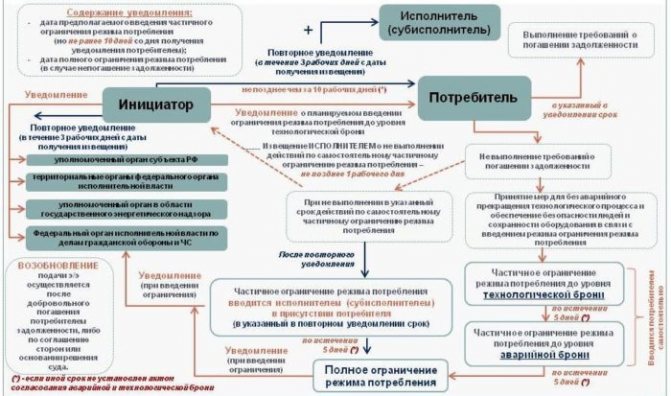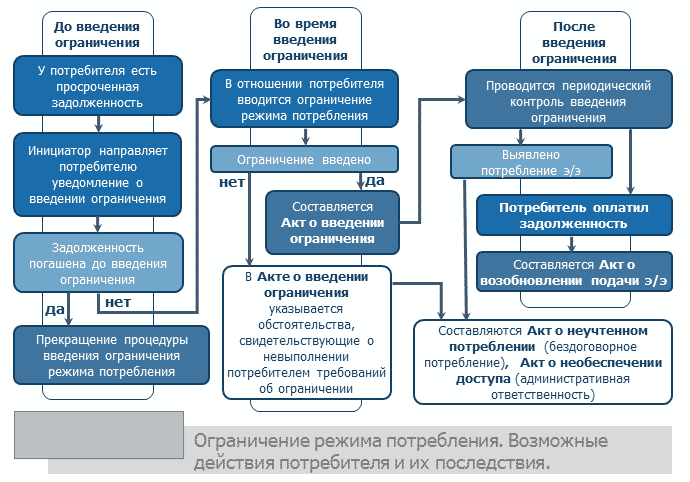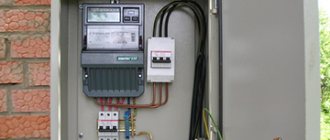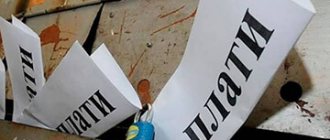What does the legislation say?
The following government regulations provide some clarity on this issue:
- No. 354 dated 05/06/2011 as amended, effective 12/26/2016 “On the provision of public services...”;
- No. 442 dated 05/04/2012 as amended on 02/04/2017 “On... complete or partial limitation of electricity consumption...”.
You can be left without electricity if you do not respond in any way to the preliminary notification, issued in accordance with all the rules.
This applies equally to both individuals and legal entities with debt.
It will be illegal to terminate the supply of electricity if:
- the debtor is a gardener who is a member of the SNT, whom the society itself is trying to leave without light;
- prior notice was not received according to instructions;
- this is due to the total debt for housing and communal services.
Compilation algorithm
The document assumes a partially free form of presentation (general). It should contain an introduction, body and conclusion. The header must indicate the location (address) of the premises, organization or site.
Next, on the left side of the document, the locality is indicated: city, village, town, etc. On the right side, the date of completion is indicated and signatures are placed.
If the process is expected to be lengthy, then a link to the document that implies it is required. In any case, there should be only one date - the day on which the paper is drawn up.
After the “heading”, it is necessary to indicate the composition of the commission in a numbered list with a mention of what it ruled, decided or stated.

Grounds for termination of supply
The supplier has the right to turn off electrical energy and draw up a power outage act in the following cases:
- unauthorized connection to the network;
- current theft;
- violation of the rules for using meters;
- non-payment for consumed electrical energy;
- in other cases directly provided for by the legislation of the Russian Federation.
It is important to know that the regulations in force in the Russian Federation prohibit electricity suppliers from turning off the lights without proper notice.
This form must be drawn up in accordance with the form, a sample of which is approved at the legislative level. Such a letter must be sent at least 10 calendar days before the expected date of termination of delivery.
If the notification form for a power outage has been duly completed, delivered to the recipient, and the consumer has not repaid his debt for the consumed electricity, then the supplier has the right to stop supplying electricity to the violator.
We suggest you read: How to repay a debt through court
The process of stopping the supply of light must be accompanied by the signing of a power outage act. The form of such an act is approved at the legislative level.
Like any other action of public or private power suppliers, termination of the supply of electricity can be challenged by you in court. If you believe that the supplier did not have sufficient grounds to turn off the supply of light to your home or business, you must defend your interests and challenge the legality of not only the termination of such supply, but also the signing of the act of turning off the electricity. And knowing your rights, it will be much easier to do this!
Who is the document issued to and is the owner of the apartment needed?
Since the act is drawn up in several copies, one of them must be given to the owner of the apartment. If the owner is not at home when the document is delivered, then they must be handed over to him within 24 hours. When the owner does not receive paperwork about turning off the lights, the procedure is considered illegal. For this reason, the management company sends registered letters or a courier to obtain confirmation of delivery of the notice.
The second copy must remain with the executor of the order, and the third is handed over to the initiator of the established procedure.
If the connection to the power supply network was made by the tenant without permission, then:
- one copy is sent to the performer;
- the second will be given to the offender;
- the third will be sent to the local inspector, who will investigate the illegal act.
Reasons for shutdown
Official decree number 354 establishes a strict order of rules that must be followed in order to de-energize a house. The performer is obliged to carry out the procedure within the established time frame and in the appropriate manner so that such actions are not ultimately recognized as illegal.
The most common reasons for disconnection are:
- consumption of energy resources without the use of accounting tools;
- unauthorized connection to the power grid (in the absence of a corresponding agreement with the company);
- improper use of metering devices, including for the purpose of stealing electricity;
- refusal to pay for services;
- non-compliance of the equipment used with safety requirements;
- performing urgent repair work;
- carrying out work according to plan, while its duration should not exceed 24 hours, and the total annual time of such work should not exceed 72 hours.
Find out here whether you can change the electricity meter yourself.
When purposefully disconnecting a certain debtor, he must first be warned.
Is it legal to turn off the lights if the owner of the house does not want to sign the document?
In a situation where the owner of the apartment does not agree with the implementation of an event to turn off the electricity, he must write about this in the act itself. Similar marks are placed on each of the three copies.

The procedure for notifying and disconnecting the consumer from the supply of electricity in case of non-payment
Then you need to prove the validity of your position. However, the owner of an apartment or house often does not have legal arguments of innocence, so the procedure will be carried out according to the established deadlines.
To point out a management error, you will need to find all paid receipts for electricity. If the issue cannot be resolved peacefully, then it is necessary to go to court.
You can also slow down the procedure by proving that the owner of the apartment was not personally given a notice against signature. If the company gives the warning verbally or by telephone, then they do not have the authority to turn off the power.
Even when the owner turns out to be right, but there is still no light, you cannot connect to the power grid yourself. These are illegal actions that will result in punishment.
If the Criminal Code restricts the supply of a resource without the consent of the owner or by mistake, then the tenant may then demand compensation for moral damage. But you will need proof:
- Witnesses who will confirm that the family was forced to consume spoiled food.
- Photos or eyewitnesses that indicate that children had to heat food over a fire or buy it in a canteen.
- Certificates from a doctor indicating a change in health. Records of high blood pressure or nervous disorder are suitable.
Each side will defend its own case, and therefore documents will definitely be needed.
What should the debtor do?
If you receive such a warning, the easiest way to resolve the problem is to make the required payment on your bills.

This is the easiest way to restore the connection to electricity.
The connection must take place within two days after receipt of payment.
It is possible that a reconnection fee may be required by the management company or the energy company.
Actions of management companies
In cases of denial of access to residential premises, management companies, HOAs and RSOs have the right to repeatedly increase payments for the use of gas, water, and electricity.
During the first month without contact with metering devices, the fee is calculated based on the average monthly consumption with an increasing factor of 1.5. After 3 months, all residents permanently or temporarily living in the premises are taken into account, and the increasing coefficient may increase to 10 and remain so until the resident makes contact.
20 days before the visit, the resident must be sent a notification; there can be several ways: telephone (with confirmation of the name of the person who answered the phone and an audio recording), e-mail, telegraph, through a personal account on the website or by fax. If the time does not suit the resident, he is obliged to notify the management company, RSO or HOA about this no later than two days before the scheduled date.
In what cases is de-energizing premises considered illegal?
Let us immediately note that a power outage cannot be carried out at random, simply because someone wanted to put pressure on the debtor.
Even if a person has not paid for electricity for a long time, it is impossible to suddenly cut the wires going to his apartment. According to established rules, a power outage should not lead to negative consequences. In particular:
- Damage to property: personal and public.
- Violation of fire safety requirements.
- Creating a threat to the life and health of citizens.
The established procedure for limiting energy resources is regulated by the provisions of Government Decree No. 442. This document also contains a list of persons on whose initiative full or partial restrictions can be carried out. This includes the supplier, the energy distribution network company and the consumer.
If we talk about specifics, a power outage is considered unlawful in the following situations:
- If electricity is used to heat an apartment building, the power cannot be turned off in the winter, even if there is an outstanding debt.
- Disconnection for non-payment - if a person regularly pays for electricity, they cannot turn off their electricity for debts on water supply, sewerage and other utilities.
- A threat to life and health is created - for example, if a small child lives in the house or there is a sick person connected to life support equipment.
- Shutting off the entire entrance/house - limiting the supply of energy resources should not violate the civil rights of other residents.
Important! Restrictions in the supply of electricity cannot be sudden, even if a person has never paid for electricity. To turn off the electricity, the initiator is obliged to notify the payer in advance. This information is conveyed in any way: telephone call, registered letter, email newsletter. After receiving the notice, the debtor has 20 days to repay the debt in whole or in part. If there is no payment, a restriction on the supply of energy resources is introduced for 10 days. In cases where this measure does not have the desired effect, the room is de-energized for an unlimited period. Usually, until the existing debts are fully repaid.
Federal Law of December 28, 2013 No. 442-FZ “On the fundamentals of social services for citizens in the Russian Federation”
Read also: Hotline of the Russian Ministry of Health







